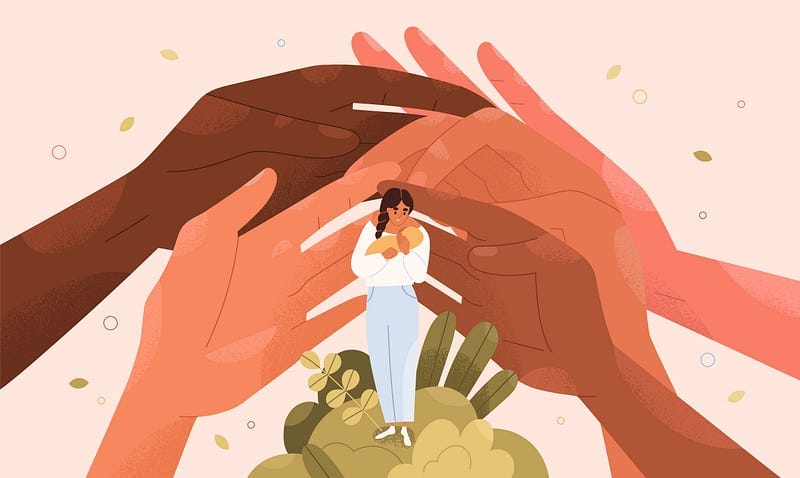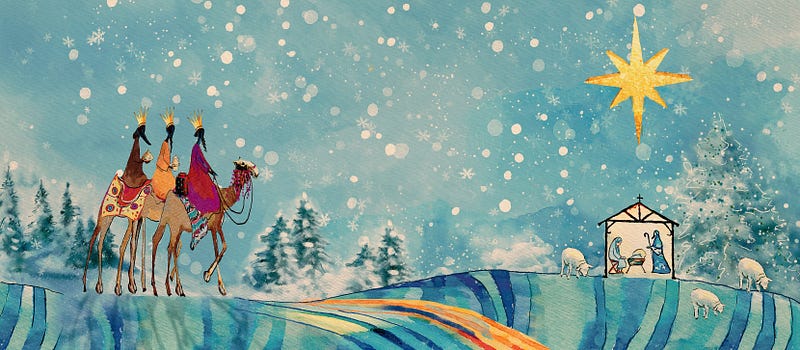Caring about Babies Means Caring for their Mothers
Epiphany, and the life and death gifts of the Magi

Caring about Babies Means Caring for their Mothers Too
The life and death gifts of the Magi

In Western Christianity, Christmas has come and gone. We’ve even made it through that strange in-between week leading up to New Year’s Eve; ploughing through the turkey, navigating the sugar fog, and wondering, “When was the last time I actually ate a vegetable?”
January 6th marks the end of the 12 days of Christmas and the celebration of Epiphany. This feast day primarily commemorates the visit of the Magi (or Wise Men) and the Holy Family.
Nowhere in the Gospel of Matthew (the only Gospel where the Magi appear) do we find out how many Magi there are. We only hear that there are three gifts: gold, frankincense, and myrrh. The traditional interpretation of these gifts say “gold, as to a king; myrrh, as to one who was mortal (myrrh was used for embalming, thus foreshadowing Jesus’ death); and incense, as to a God.”
There’s been a running joke, perhaps for centuries, about the impracticality of giving a baby things like fine perfume and jewelry. A meme floats around Facebook every Christmas. The caption reads, “After the three wise men left, the three wiser women arrived.” You can see, the women are handing Mary diapers, casseroles for the week, and formula. At first glace, these seem like much more practical gifts (although, I sure hope Mary has access to clean water for the formula). These are gifts that demonstrate care for a new baby and his mother.
Setting the stage
In case you aren’t familiar with Matthew’s account of Jesus’ birth, here’s a bit of back story.
The Magi have seen a star in the East and they tell Herod, Judea’s Roman Jewish client king, they are seeking to find the newly born “king of the Jews.” Herod sneakily implores the Magi to find the baby so that he can pay homage, even though it’s clear to the reader Herod wishes to do no such thing. The Wise Men find the baby, present him with their strange gifts, but go home via another route because they’ve been warned in a dream (dreams are a big theme in Matthew), of Herod’s true intent.
What comes next is nothing short of state-sanctioned genocide. After the wise men leave, Joseph is warned (in another dream) that he, Mary and the baby need to get out of Judea immediately and flee to Egypt. Herod then orders that every boy under the age of two to be killed.
Matthew quotes from within the Hebrew scriptures:
A voice is heard in Ramah,
weeping and great mourning,
Rachel weeping for her children
and refusing to be comforted,
because they are no more.
Matthew 2:18 (quoting Jeremiah 31:15)
Refugees in Egypt, Jesus’ family does not return until after Herod’s death, finally settling in Nazareth.
Violence and the politics of movement
I have a very dear friend whose 5-year-old son asked over Christmas about Jesus and the whole “Son of God thing.” This friend has very little background in church, Christian stories, or the often perplexing quirks of the Christian faith. She told her son that Jesus was born among animals, with very little fanfare, and that people feel bad about it now because he was supposed to be the Son of God. Then she added, “But it hasn’t really changed hospitality for poor women and their children, and that doesn’t really add up for me.” We have talked about this at length before.
She honestly doesn’t understand how what she perceives as a faith centered around the story of an unwed mother experiencing poverty and the politics of movement isn’t entirely devoted to the care and advocacy for the poor and those on the run from violence.
She’s not wrong.
The way the we tell the Jesus Story matters. If Christians claim these stories, I don’t see how they can’t influence how we engage with the world.
If we tell a story about a poor, unwed mother, who gives birth among farm animals because there is no room for her family in the inn—and yet God still comes anyway—that should continue to inform how we treat those experiencing poverty, those who have been excluded and those who have been displaced.
If we are telling a story about the Holy Family needing to flee violence and bloodshed, being forced to live in a foreign country until it is safe to return, I don’t see how that can’t inform how we encounter refugees and others within our own communities who are desperately needing to leave terrible situations.
These are places where God shows up.
What would it mean to think about this story differently?
The gifts of the Wise Men seem so impractical. What baby needs frankincense, gold, and myrrh?
However, frankincense and myrrh are not only expensive incense and ointments. They were also traditionally used in postnatal care because of their anti-inflammatory and antibiotic properties. I promise, this is a true story.
What would it mean if these powerful men were bringing gifts to aid in Mary’s healing? What would it mean if the gold the wise men presented was the means for Jesus’ family to survive those years as refugees in Egypt? What would it mean if these seemingly strange baby shower presents were not simply symbolic gestures of Jesus’ status? That the gifts of the Magi to Jesus were actually meant to keep his family alive? What if these are gifts that are useful, demonstrate care for a new baby, and the mama who is tasked with caring for him.
Because, if we care about the baby Jesus, if we’re going to sing the songs to welcome him, then we also need to care about his family too.
Throughout Advent, a time of waiting and preparation, Christians spend time honouring Mary; honouring her bravery in saying yes to carrying and caring for this divine child.
Now that Jesus is born, Mary’s role is no less important. As any parent knows, it’s after the birth that so much of the real work begins. But parents can’t function effectively if they are not supported, if they are not healthy, and if they are not cared for themselves.
Caring for children means caring for their parents — especially their mothers. It means caring about mothers within our communities doing the best they can in desperate situations.
It means caring about migrant parents separated from their babies in detention centres at the U.S. / Mexico border.
It means caring about refugee parents who have fled violence, persecution and situations over which they have no control.
Christmas may be over. Jesus has arrived. Mary is still here, Joseph is still here, and like so many other families in the world fleeing cruel and brutal regimes, the Holy Family is about to make a run for their lives.
It is a story that plays out every single day all over the world. So, if we’re going to sing the songs to welcome Baby Jesus, with this timeless story of care, we also have our call and our task.
A version of this article was originally presented as a sermon, offered during Sunday worship on Sunday, January 5, 2020 [Epiphany] at Jubilee United Church in Toronto.
If you like what you read, be sure to 👏🏼 below and subscribe. 💌
You can also find me on Twitter and Instagram, or leading Resistance Church — an entirely online, 🏳️🌈🏳️⚧ ️positive faith community centered around rest, hope, and community as holy resistance to an unjust world.
